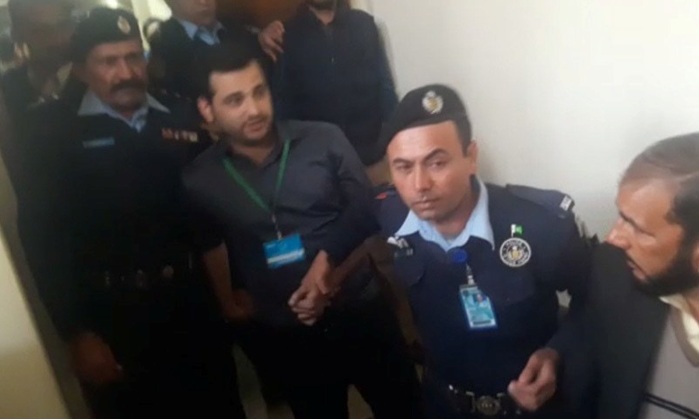Haseeb Bhatti

Prime accused Shahrukh Jatoi at court on Thursday-DawnNews
The Supreme Court on Thursday set aside the Sindh High Court's (SHC) decision from last year ordering a retrial in the Shahzeb Khan murder case.
A new bench of the SHC will hear any appeals in the case filed by the civil petitioners within two months.
The case against the accused — Shahrukh Jatoi, Siraj Talpur and Sajjad Ali Talpur — will now be heard by the anti-terrorism court (ATC). "Evidence and arguments will be heard from scratch," the SC ruled, adding that the bails of the accused were against the law.
The accused, who had been released on bail after the SHC had ordered a retrial in the case, were immediately taken into custody by Islamabad police and will be handed over to the Sindh police. The court ordered that their names also be placed on the Exit Control List (ECL).
The bench turned all petitions by the civil society into a suo motu notice. The reason for setting aside the SHC decision will be recorded later.
In his remarks, the chief justice also said that the victory sign made by Jatoi during one of his initial appearances before the court made a mockery of the judicial system and the people of the country. "The victory sign [Jatoi flashed] has led to his downfall."
A three-member bench of the SC, headed by the chief justice, was reviewing a civil petition on the Shahzeb Khan murder case, which is being re-examined after several petitioners contested a SHC decision to order a retrial of the case.
During the hearing Justice Nisar said that according to Article 187 of the constitution, the court has the right to ensure justice is provided. The chief justice also asked whether a settlement could be acceptable in a terrorism case.
Justice Asif Saeed Khosa inquired whether a suo moto notice can be taken on the release of suspect at which the accused's counsel said that he would welcome a suo moto notice in the case.
"The court will not review the entire case in the suo moto," the chief justice replied.
Latif Khosa also claimed that his client was subjected to oppression as he was kept in a death cell for five years and was not even allowed to give his examinations as he was deemed a dangerous criminal.
He also argued that the court should not accept petitions seeking dismissal of SHC decision as the justice system will suffer a setback if civil petitioners were allowed an appeal in a criminal case.
Lawyer and rights activist Jibran Nasir and other citizens of Karachi had filed an appeal in the SC against the SHC decision to retry Sharukh Jatoi and his accomplices in the Shahzeb Khan murder case.
In November, the SHC had set aside the death penalty awarded to the accused and ordered a retrial in the case in a sessions court. The court's decision was taken on a criminal review petition filed by Jatoi's lawyer, who argued that terrorism charges should be dropped as the prime suspect was a juvenile at the time of the offence.
"The citizens have been deeply affected and aggrieved by judgement of the SHC whereby terror charges were removed against Shahrukh Jatoi and three others in the case of killing of youth Shahzeb Khan," the appellants had said.
Terrorism or not?
The debate on whether Shahzeb's murder constitutes as an act of terrorism had continued in the SC earlier today, with the counsel of the accused, Latif Khosa, arguing that the first-information report (FIR) had mentioned that the incident was an escalation of a fight between children. He had said the allegation is that Shahrukh Jatoi and Siraj Talpur both shot Shahzeb once.
"This is not an allegation but a fact," Chief Justice Mian Saqib Nisar had corrected Khosa.
Shahrukh's counsel said his clients had accepted that they were in possession of a pistol at the time of the incident but that they were only indulging in aerial firing.
He added that his client has sympathy for the victim, which is why they have apologised to the family and also paid Diyat (blood money).
Khosa suggested that his client was being prosecuted for belonging to an affluent family. He told the court that the victim was also the son of a deputy superintendent police (DSP) and had slapped the accused first.
Khosa said there were multiple instances of the SC removing anti-terrorism act (ATA) sections, to which the chief justice had countered that there were also many cases where terrorism sections were added by the apex court.
The murder of Shahzeb Khan
On the night of December 24, 2012, 20-year-old Shahzeb Khan, the son of Deputy Superintendent of Police Aurangzeb Khan, was gunned down in Karachi's Defence Housing Authority when he was returning home with his sister from a wedding.
Shahzeb was killed during for picking a fight with one of the suspects’ servants, who had verbally threatened and harassed his sister.
Then chief justice Iftikhar Chaudhry had taken suo motu notice of the incident, which sparked widespread outrage across the country through newspapers, TV channels and social media.
As the prime accused belonged to powerful feudal families of Sindh, the incident had triggered a nationwide debate over whether the country’s elite could be held accountable for crimes they committed.
Later, after a speedy trial, Judge Ghulam Mustafa Memon of Anti-Terrorism Court-3 sentenced Shahrukh Jatoi and co-accused Nawab Siraj Talpur to death. Sajjad Talpur and Ghulam Murtaza Lashari, the Talpurs’ servant, were handed life imprisonment for their involvement in the murder.
A couple of months after the sentence, however, Shahzeb's parents had issued a formal pardon to the convicts.
Source:
Dawn.com,February 01, 2018
Send email to nazeerkahut@punjabics.com with questions, comment or suggestions
Punjabics is a literary, non-profit and non-Political, non-affiliated organization
Punjabics.com @ Copyright 2008 - 2018 Punjabics.Com All Rights Reserved
Website Design & SEO by Webpagetime.com


